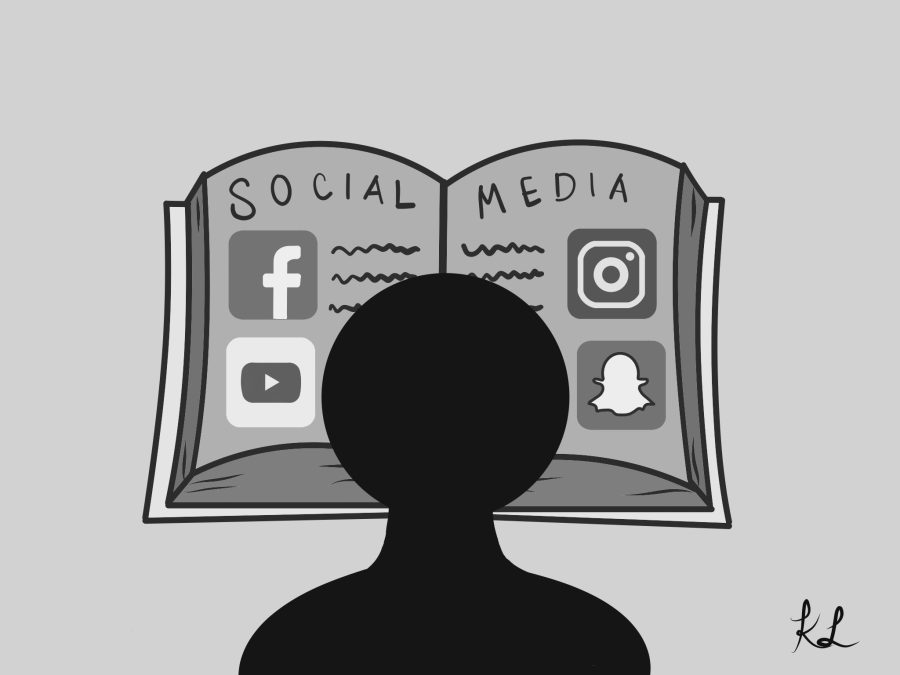As the day-to-day lives of younger generations become more enmeshed with technology, teenagers across the nation are constantly bombarded with new variants of social media, each offering unique ways to pull the user away from the present moment.
If education on facing the dangers of social media can be incorporated, teenagers wouldn’t be so anxious or unprepared.
Teenagers are becoming more reliant on their devices. According to the Anxiety and Depression Association of America, the progression of internet dependence parallels the influx of online harassment cases and depression and anxiety due to social media. Education on how to safely and efficiently maneuver through the repercussions that arise as a result of heavy reliance on social media, including anxiety and online harassment, should be conducted for high school students in a structured school manner.
Whenever a break is offered in class, or even when a lecture gets a little too dull, the immediate reaction of many teenagers is to turn to the internet.
The dependence that teens have on their devices and social media accounts can foster many dangerous side effects. These effects, according to the Anxiety and Depression Association of America, include addiction, social media anxiety, loneliness, sadness and even depression.
One of the less talked-about dangers that sometimes comes with the excessive use of social media is online harassment. This can present itself in many forms, including receiving unsolicited messages containing sexual content, threats, blackmailing or any unwanted comments.
As incidents involving online harassment and negative emotional effects caused by excessive time spent online continue to occur in our community, the need for a space to discuss the effects of social media and learn how to use it constructively has become more and more evident.
Dana, a female student who asked that her name be changed to protect her privacy, said she has experienced several threats through social media, and ended up deleting her accounts because she felt overly vulnerable online.
According to Dana, a male student threatened to expose very personal information to all of their classmates if she did not send him nude photos over Snapchat. She remembers feeling violated and unsure of how to handle the situation.
Given the technologically reliant world that we live in, education regarding social media use should be a mandatory topic for all students.
In the past, the administration has set up sexual harassment assemblies designed to help students make the right decisions in sexual situations.
Some students decided to skip these assemblies, so incorporating this education into a more structured classroom environment would be the best way to guarantee attendance.
This education could be incorporated into the Paly curriculum in several different ways. Grade level-wide assemblies during advisory usually draw the largest turnout, but during these assemblies, it is difficult to foster student input and actually converse about the issues. Bringing this conversation into advisory class and allowing students to express their opinions and personal questions would serve as a more efficient and interactive way of receiving information. Another option is the inclusion of this education into Living Skills.
Living Skills, a class required to graduate, offers information and procedural tips on a wide variety of topics that are relevant in today’s world.
The teachers of this course possess the skill set and experience to address sensitive topics such as sex, drugs, family, ethics and more, so tackling sexual harassment could tie into the curriculum.
Letitia Burton, one of the Living Skills teachers at Paly, believes that education surrounding online harassment and the dangers of social media are is most effective when introduced before students have begun high school.
According to Dana, knowing exactly what to do in an uncomfortable situation online should be common knowledge in schools, and should begin sooner rather than later.
The dependence that teens have on their devices and social media accounts can foster many dangerous side effects.
If education on facing the dangers of social media can be incorporated into a class similar to Living Skills or in assembly-form, teenagers wouldn’t be so anxious or unprepared when these issues arise. They will have the means to tackle routine dilemmas regarding online harassment and feel safe while using social media.

